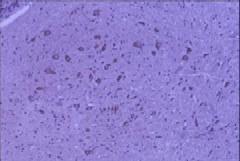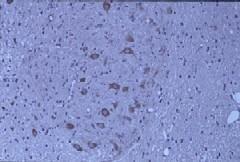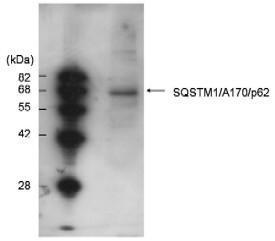Anti SQSTM1/A170/p62 Antibody
Sequestosome 1(SQSTM1)/A170(mouse)/p62(human)/ZIP(rat) is a ubiquitin-binding protein whose expression is regulated depending on oxidative stress. Abnormal expression of SQSTM1 leads to the development of metabolic bone disease, obesity, and type 2 diabetes. SQSTM1 has been reported to bind to an autophagy-related factor called LC3 and is considered a protein inducing the protein degradation from the ubiquitin/proteasome system to the autophagy system.
This product is a anti-Mouse SQSTM1 (A170) rabbit antiserum and can be used for Western blot, immunohistochemistry, and immunofluorescence.
Product Information
- Product Form: The antiserum is a two-fold dilution preparation and has been absorbed by E.coli proteins (contains 0.1% NaN3 as a preservative).
- Immunogen: Recombinant murine SQSTM1 (A170) with AA254-333 containing T7 tag at the N-terminal and His tag at the C-terminal.
- Specificity: Reactive with murine and rat SQSM (A170/ZIP). Slight reactive with human SQSTM(p62)*.
* Use with human samples will not be recommended as the reactivity with human SQSTM1 is very weak. - Working Dilution:
Western blot 1:200
Immunohistochemistry 1:1,000
Immunofluorescence 1:1,000
Applications
Immunohistochemical Staining
 Rat Cerebellar Dentate Nuclei Rat Cerebellar Dentate Nuclei |
 Rat Basal Ganglia Rat Basal Ganglia |
Fixation: 4% paraformaldehyde
Embedding: Paraffin
Staining: Avidin-biotin peroxide
Primary antibody: Anti-SQSTM1/A170/p62 (1:1,000)
Secondary antibody: Anti-rabbit IgG, biotin-conjugated
(Data: bY courtesy of Dr. Nakaso, Tottori University)
Western Blot

Sample: Cultured murine vascular smooth muscle cell lysate, 20 μg
Antibody: Anti-SQSTM1/A170/p62 (1:200)
(Data: by courtesy of Dr. Ishii, Tsukuba University)
References
- Ishii, T., Yanagawa, T., Kawane, T., Yuki, K., Seita, J., Yoshida, H. and Bannai, S. : Biochem. Biophys. Res. Commun., 226, 456(1996).
- Ishii, T., Itoh, K., Takahashi, S., Sato, H., Yanagawa, T., Katoh, Y., Bannai, S. and Yamamoto, M. : J. Biol. Chem., 275, 16023(2000).
- Komatsu, M., Waguri, S., Koike, M., Sou, Y.S., Ueno, T., Hara, T., Mizushima, N., Iwata, J., Ezaki, J., Murata, S., Hamazaki, J., Nishito, Y., Iemura, S., Natsume, T., Yanagawa, T., Uwayama, J., Warabi, E., Yoshida, H., Ishii, T., Kobayashi, A., Yamamoto, M., Yue, Z., Uchiyama, Y., Kominami, E. and Tanaka, K. : Cell, 131, 1149(2007).
- Nakaso, K., Kitayama, M., Ishii, T., Bannai, S., Yanagawa, T., Kimura, K., Nakashima, K., Ohama, E. and Yamada, K. : Brain Res. Mol. Brain Res., 69, 155(1999).
Product List
- Open All
- Close All
For research use or further manufacturing use only. Not for use in diagnostic procedures.
Product content may differ from the actual image due to minor specification changes etc.
If the revision of product standards and packaging standards has been made, there is a case where the actual product specifications and images are different.



